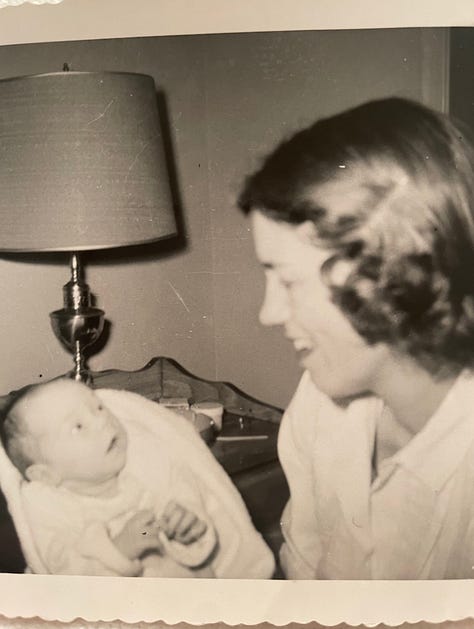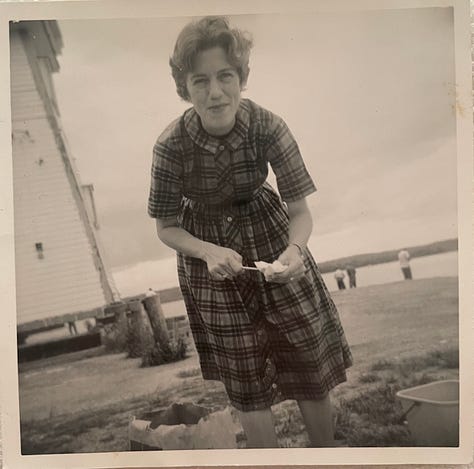It was ten years ago, give or take, and I was visiting my parents’ home in Delaware. I asked my mother if she had a blow dryer. She produced one that appeared to have been manufactured in the late 20th century and pointed earnestly to the two settings on the handle, “On” and “Off.”
“You push it here to turn it on,” she said, indicating the “On” setting, “and then here —” now extending her index finger toward the “Off” setting, “to turn it off.”
I thought this seminar hilarious and tweeted about it. Most people also found it hilarious. But one woman scolded me, saying her mother was dead, and she would give anything to still have her around to explain the basic functions of basic appliances. She implied that one day my mother would die and I would regret laughing about this.
Well, my mother died early on Sept. 71, and I still think it’s hilarious. Here’s the part where I’m supposed to write: And she would, too. But I can’t say that. My mom – whom I called “Mama” – had the challenge of spending her adult life as a sincere, kind, earnest person surrounded by incorrigible smart asses.
Smart ass #1 was my father, Theo Lippman Jr., a brilliant man with a temperament so demanding that my mother claimed she threw plates at him during the early years of their marriage. Frankly, I’m not sure why she stopped.
Smart ass #2 was my older sister, Susan, now in the memory unit of an assisted living facility. And still a bit of a smart ass, truth be told. Recently, in one of her lucid moments, she totally eviscerated a memoir she had just read. (“I wanted to read about her, but it was all about him, and who cares about him?”2)
I am smart ass #3. Once, I so exasperated my mother, she said, “Don’t be dumb.” My sister reminded her that one was not supposed to call children dumb, only their actions. My mom said: “But this is a dumb child.”
Maybe she had a little smart ass in her, after all.
What she definitely had was something much better than an aptitude for snark: an ability to make forever friends, starting with her first cousin (Amelia, no longer with us), then boarding school, then college, then basically every place she ever worked or lived. People LOOOOOOOOOOOOOOOVED my mom. At the library where she volunteered. In her tiny Delaware community where she was sort of a proto-Karen, enforcing her private subdivision’s rules.3 At the produce stand4. At the very corporate financial firm that managed her money for 30 years. Everyone loved my mom. Frankly, her universal appeal was a little mysterious to me, and maybe that’s what’s wrong with me, but this isn’t about me. It’s about my mom. Who was great. Even when she was driving me crazy.



Six days before my mom went into cardiac arrest never to again regain consciousness, I had said to my daughter: “I was a little cranky with Grandma Madeline today.” My daughter assumed that meant her grandmother was in the wrong, but I assured her it was my fault. “Oh, when I use the word ‘cranky,” I’m acknowledging that I’m being kind of a bitch.” I was a little bitchy. To my mom. Six days before she went into cardiac arrest. I should feel guilty, right?
I don’t because 1) I was actually doing my best in the moment 2) it was not my last encounter with my mom and 3) I don’t think relationships are defined by last encounters. I was a pretty good daughter to my mom, especially over the last three years, especially when one factors in the fact that I’m a borderline sociopath.
My mom had a complicated life. I had all the info and yet I didn’t have all the info. My mother was the daughter of the gorgeous and beloved Mary Moore Mabry, who died while my mom was still in her 40s. My mother never knew her biological father, Carl Hopper, and considered her stepfather, Emory Speer Mabry Jr., aka “Big” Speer, her father.5
Around the time I was 10 years old, my mother decided to apply to graduate school, but her school transcripts did not align with her birth certificate because my grandmother had used the name “Mabry” when enrolling my mother in school. And no one cared about the difference between the name on her birth certificate and the name on her transcripts until she decided to get a master’s degree in library science and the University of Maryland was like, um, who are you, Madeline Hopper or Madeline Mabry. My mom had to be adopted at the age of 39, which is, IIRC, when her brother found out they did not have the same father. I could be wrong about that.
There are more devastating details. I have known them for a long time, but it’s only in the past 10 years that I could disentangle myself from our family history and begin to see it from the perspective of my mom, the person who was always, from childhood on, being asked to make everything OK for everyone else.6
I could write a novel about my mom, and I just might one day. I also could write a traditional newspaper obituary, something at which I once excelled, but I don’t want to confront the key facts I don’t know. (How many places did my mother live during her peripatetic childhood? What year did she graduate Brenau College? Why did she decide to become a children’s librarian?) My mom once suggested I start taking an oral history from her, but I didn’t know where to begin. Our relationship was defined largely by reticence, an unspoken agreement about what topics to avoid. I am an Amazonian over-sharer in a family of tiny modest bird-boned people, blunt and candid where they are tactful and reserved. All the Lippmans feared that I would tell their secrets and now that I’m the last one standing – my sister’s in a wheelchair, I am literally the last one standing, if not quite figuratively – who knows what will happen?
My mother’s decline was shockingly sudden. They say life comes at you fast, but death can, too. She went, in the space of four weeks, from living a vibrant independent life to being in rehab for a compression fracture to dying less than 48 hours after EMTs were called to resuscitate her. Over her last two days, I felt obligated to tell every nurse and doctor I met, You need to understand how healthy she was, how independent she was not even a month ago. She began every morning by reading the New York Times and the Baltimore Sun in a light-filled alcove at Roland Park Place, her home for the last two years. She went to ball games and museums and plays. She was head of the recycling committee! She kept MSNBC on for much of the day; at the moment she suffered the sharp pain that marked the beginning of the end, she had just watched President Biden’s speech at the DNC, something I had not even tried to stay up for.
Two things were giving my mom hope this summer: the Orioles and the possibility that she might see a woman elected president before she died. So, in lieu of flowers or casseroles, please root for the Orioles and vote for Kamala Harris.7 And if you’re a Baltimorean, swing by Eddie’s for some cheddar biscuits, which I brought to my mom regularly. I found six of them in her freezer. She had taken them out of the plastic bag and wrapped each one in aluminum foil, then placed them back in the bag, the better to reheat them individually. This was Madeline Mabry Lippman in a nutshell. We all tell ourselves we’re going to prep our food — wash our greens, ensure the future perfection of our biscuits. My mom actually did it. She also had already finished all her get-out-the-vote postcards to Georgia voters (note the little checks on the side).
One last thing about my mom: Inside her address book, I found a typewritten list on her personalized stationery, about a dozen names and phone numbers. Although it has no heading, it is clearly a list of those who should be called in the event of her death. She had drawn a delicate pencil line through the names of those who have died since she composed the list. I will simply never be that organized — and she knew it.
Which, by the way, would have been my dad’s 95th birthday.
Sorry for the literary blind item and I don’t necessarily agree with my sister here.
But nice!
In the 1970s, my mom convinced the truck farmer who ran a seasonal stand near our house to start growing okra, just for her. My mom made great fried okra.
I once saw my grandfather stump a name-guesser at the State Fair; it was the coolest thing ever.
Just one detail about the fucked-upness of my mother’s family. My grandmother’s father died when she was 10, and as the oldest of three girls, she had to learn how to drive because her mother refused. I always thought that story was so charming — until I learned that my great-grandfather died in a car accident.
If you disagree with my mother’s politics, that’s fine, but this is not the time or the place to explain it to me.









Hundreds of us you will never meet are grieving for you right now. In many respects, you have opened your life to us, and also shared your talents with us, and now we share your grief. May your mother’s memory be a constant blessing. Know that you were a very good daughter.
Oh Laura, I am so sad for you. Your mom was extraordinary. But you know that. You have so beautifully described her life, with all its kinks & highlights, she'd be proud. Our moms' voices never leave us. You'll hear her tell you the hairdryer instructions again, or wear a sweater b/c it's chilly out. Sometime you'll be standing still & you'll hear the echo of her laugh, so near that you'll turn around, expecting to see her. Your mom IS worthy of a novel, but her life & legacy is already enough.